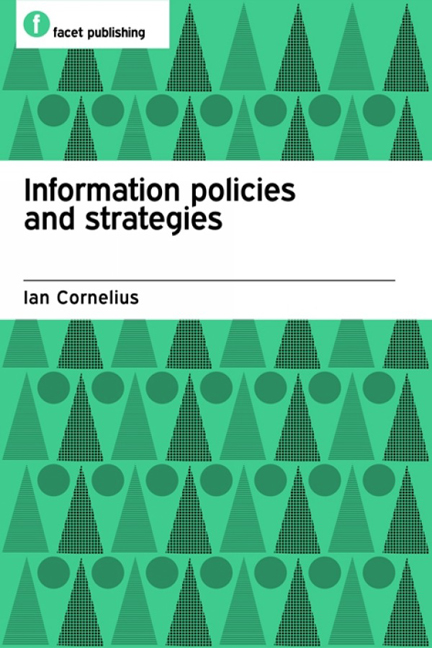Book contents
- Frontmatter
- Dedication
- Contents
- Preface
- 1 Introduction
- Part 1 Contexts for information policy
- 2 Globalization and information societies
- 3 Information policy and the public sphere
- 4 Information rights and information policy
- Part 2 Information policy sectors
- Part 3 Conclusion
- References and reading list
- Index
2 - Globalization and information societies
from Part 1 - Contexts for information policy
Published online by Cambridge University Press: 08 June 2018
- Frontmatter
- Dedication
- Contents
- Preface
- 1 Introduction
- Part 1 Contexts for information policy
- 2 Globalization and information societies
- 3 Information policy and the public sphere
- 4 Information rights and information policy
- Part 2 Information policy sectors
- Part 3 Conclusion
- References and reading list
- Index
Summary
WHEN WE SPEAK of globalization we should understand exactly how the term is being employed, as this will affect our understanding of how information policies should be shaped, understood or changed. Asimilar caution applies to our use of the terms public sphere and information society.
Globalization can be used to describe a recent phenomenon that has transformed much of international life, or at least has transformed much discussion about the impact globally of changes in the world economy and especially in financial services. If the term really is used to describe these transformations it should be a shorthand for a very complex set of changes, and it might be more common to speak of subsets of the overall phenomenon that relate to particular sectors. We are immediately in territory where extreme care is advised. Such descriptions, and we would want to know that they are accurate and comprehensive, may indeed describe current changes or conditions, but the image so created will predispose us to select certain policy options in a very wide range of sectors. Any description will seek the authority of accuracy and comprehensiveness but may also seek the persuasiveness of being predictive as well as explanatory: our simple term ‘globalization’ suddenly becomes something close to a model and goes well beyond being a mere description.
A second temptation, beyond accepting a plausible model of recent world changes, is to accept that the term, in this case ‘globalization’, but it might also be ‘information society’, goes well beyond being a mere model to explain current changes and predict future movements. It is actually a concept that embraces far more than changes in volume or direction and in fact amounts to a substantive qualitative change in our society across the globe. When ‘globalization’ is used like this we are being asked to accept that models, understandings, explanations and expectations are to be jettisoned in favour of a new understanding not only of the situation as it is, but also of how the interplay of economic, cultural, social, political and financial forces will work in future and what substantial differences we must accept as the basis for our own future actions and decision making in consequence.
- Type
- Chapter
- Information
- Information Policies and Strategies , pp. 27 - 42Publisher: FacetPrint publication year: 2010



